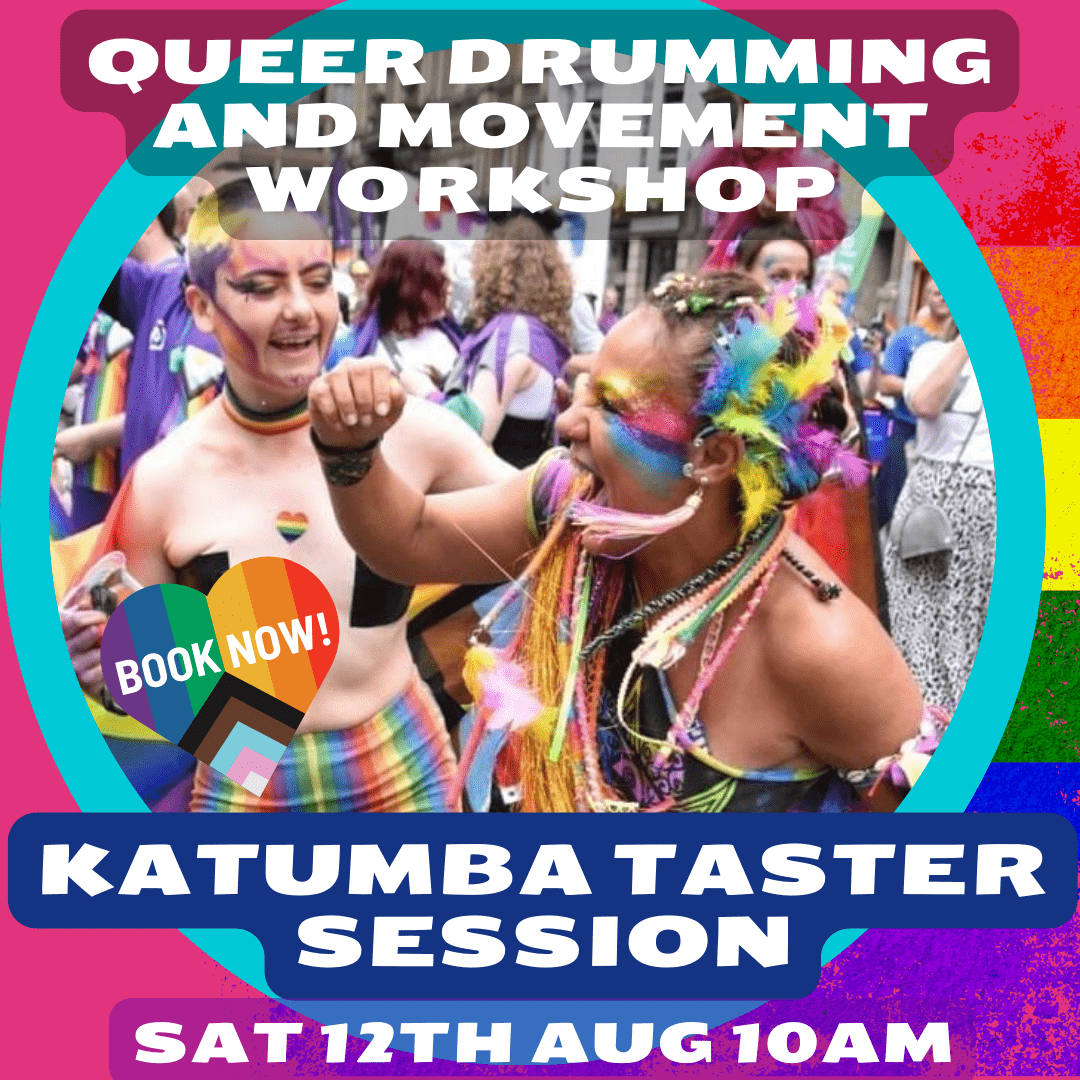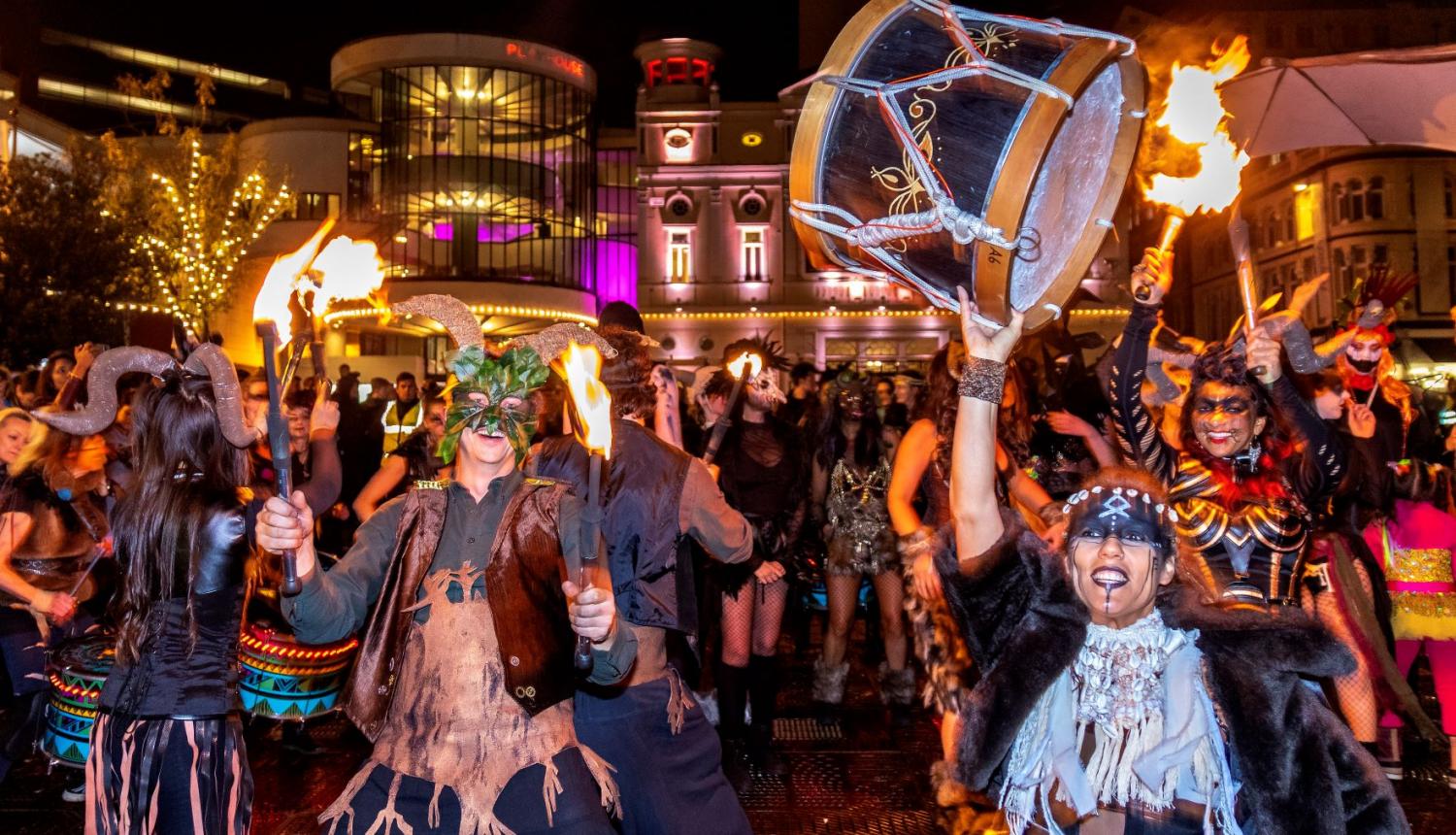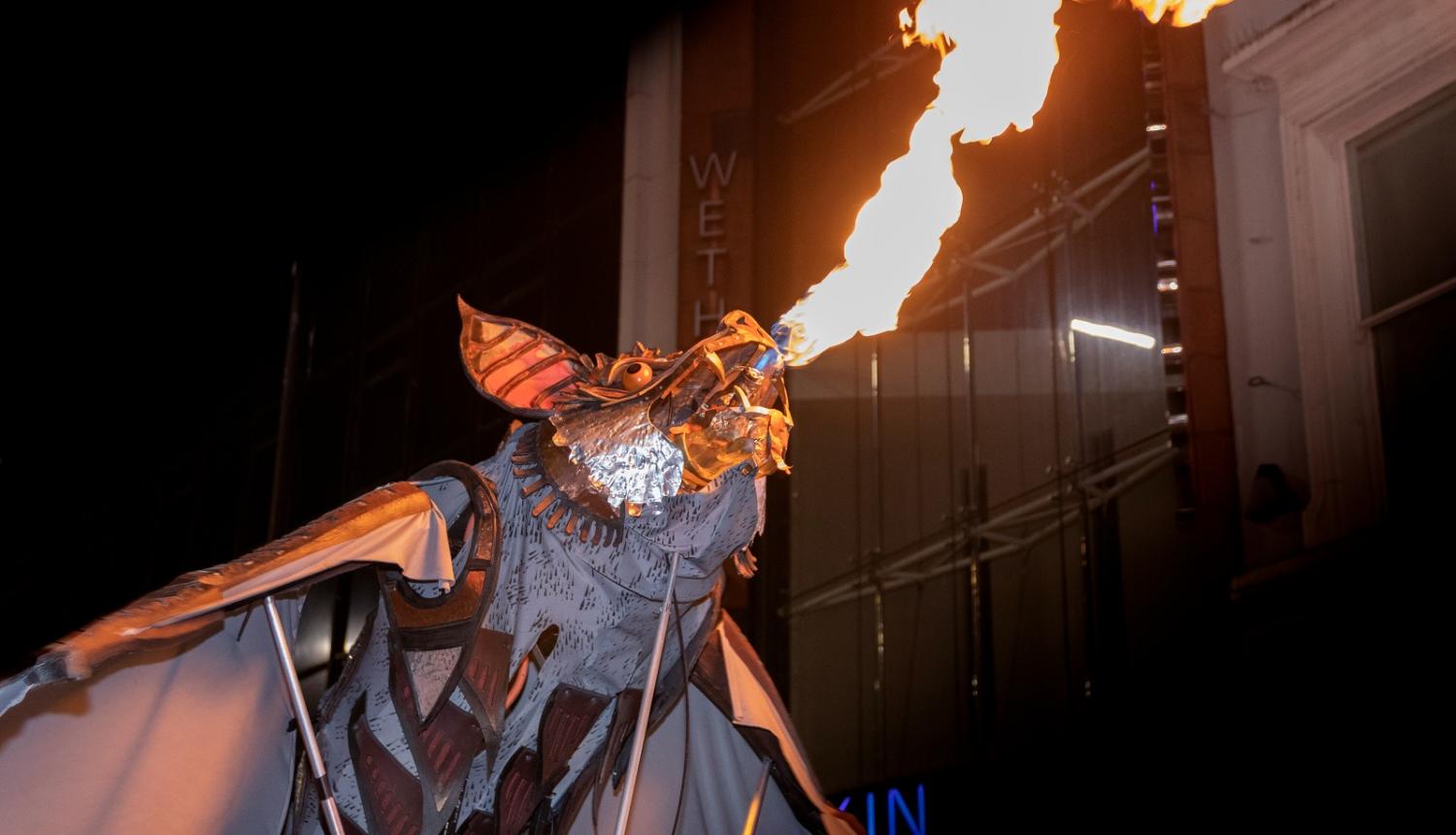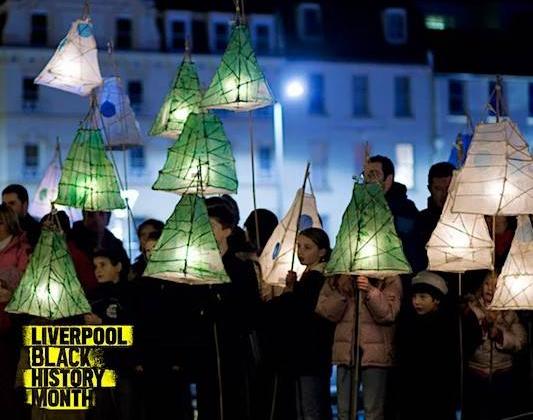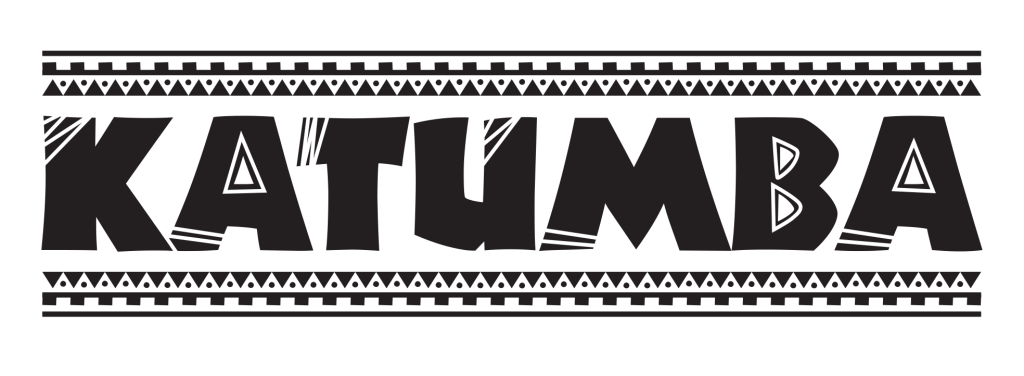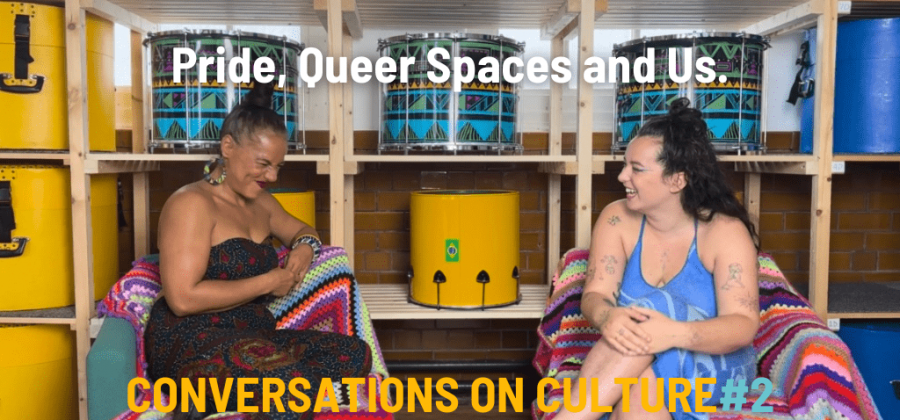
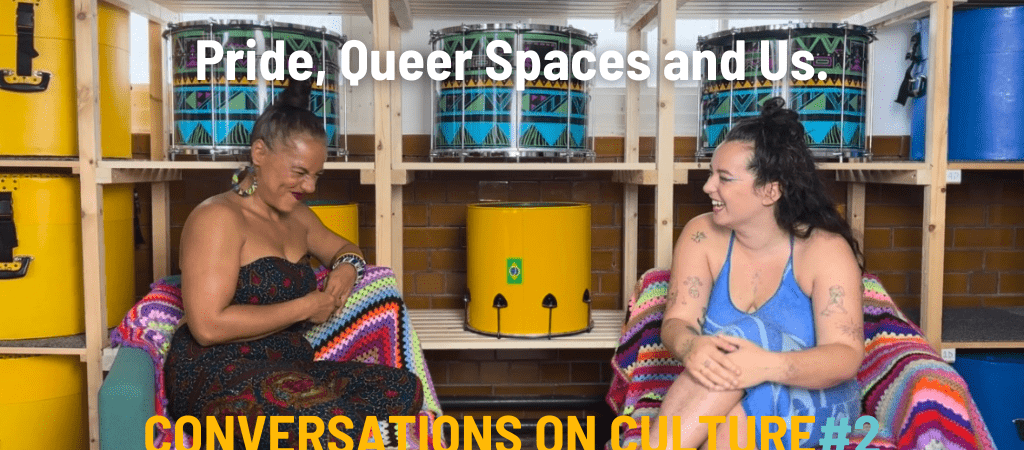
Conversations on Culture Episode 2: Pride, Queer Safe Spaces, and Us
In the second in our series Conversations on Culture where we discuss issues close to our hearts, we discuss Pride, queerness and the carnival arts, a
Conversations on Culture Episode 2: Pride, Queer Safe Spaces, and Us
In the second in our series Conversations on Culture where we discuss issues close to our hearts, we discuss Pride, queerness and the carnival arts, a
Hello everyone, I am Juliana Pinheiro Landim, the co-Founder and Managing Creative Co-Director of Katumba Drumming and Movement.
I am excited to announce the second episode in our new series of conversations that we are having in our community and beyond, called Conversations in Culture.
Before we get started, I wanted to say that this new series, which will be in the form of written features here in our News section, videos on YouTube and sampled across our social media, are not meant to be academic, nor are they politically motivated in support of any particular politician or party.
In addition, they are not meant to be me or my colleagues speaking on behalf of a community or groups of people.
They are simply my sharing my opinions, points of view, as an Afro-native person who migrated here to the UK, and one of the very, very few who actually works in the carnival arts sector (an expression that comes from Afro cultures in the Caribbean and in Brazil) – and how I experience that as Afro-native Brazilian, Queer, cis female in the sector.
So without further ado, I present our second Conversation in Culture and our second theme, where I sit down with Katumba team member, Alessia Naccari to discuss our perspectives on Pride, our experience as queer people in the carnival arts, and the importance of queer safe spaces – such as our upcoming Queer Taster.
Watch it on YouTube>>>
You can also read the full interview below. But before you do, here is all the info you need on our forthcoming Queer Taster event on 12 August. See you there!
QUEER TASTER SATURDAY 12 AUGUST
BOOK NOW
Run by, and for those who are part of the LGBTQIA+ Community!
Come and see what the Katumba buzz is about and how it supports your wellbeing! With drumming, movement and addictive carnival beats!
Both Pride and Carnival were originally acts of protest – so there’s no better way to celebrate than by bringing them together!!!
The session will be led by our Co-Director Juliana with the help of Alessia who are both proud members of the LGBTQIA+ community, so expect a gorgeous, unapologetically queer safe space!
Sat 12th August
10am – 12pm
Katumba Culture Hub, John Archer Hall
Donation tickets available.
BOOK NOW
Any questions please email us at hello@katumba.co.uk
Juliana
Hello I am Juliana Pinheiro Landim. I am the co-founder and Managing Creative Director for Katumba and I identify as an Afro-indigenous cis queer woman.
Alessia
Hello, I am Alessia Naccari, I am part of the Katumba team. I am also a queer creative from London based in Liverpool, with my passions lying in queer activism and celebration and creating diverse and creative spaces.
Juliana
Welcome to our Conversations on Culture series, where we explore our approach in the carnival arts to themes such as cultural appropriation versus appreciation and the role of cultural identity, amongst other things.
Alessia
In this episode we are going to talk about the importance of pride, queer safe spaces, our queer taster, and how the carnival arts and queer arts link.
Juliana
Although I have identified as a queer woman, I’m currently in a relationship with a straight man. So I wanted to bring you in Alessia, to share your perspective and your lived experience, which will be quite different from mine.
So thank you for being here.
The first question I wanted to ask you is, what does pride mean to you?
Alessia
On a personal level, it is a beautiful celebration with my chosen family, and also going out onto the streets with people that you might not know, but you are connecting with even non-verbally, just with a common goal of showing the world who you are.
It’s also an incredibly important time to reflect on those queer people that came before us and fought for like what we can do as a queer person, like Marsha P. Johnson and Sylvia Rivera who spearheaded the Stonewall movement and riots.
They kind of created what we see as a pride march today. So as extroverted and glamorous and camp Pride can be, it is also a time to reflect.
So what does Pride mean to you Juliana?
Juliana
When I think about Pride, being an English speaker as a second language, I look at the definition. I love this definition, that says that pride is consciousness of one’s own identity, or one’s own dignity.
I love that definition because it takes it back to what Pride is really about, us feeling dignified and proud of who we are in our identity and also celebrating each other in that identity. Recognizing allowing and also supporting each other in whoever we are.
Alessia
So what was it like growing up queer in Brazil?
Juliana
Well, I didn’t really have a sense of the queer identity back then I just knew as a child that I felt attracted to women as well as men. But that came with a huge sense of guilt, given that Brazil is a vastly Catholic country, and all the guilt that comes with the indoctrination.
And also, within my community, and my family, it was definitely something that was not seen as acceptable or good.
So it was really conflicting for me. It was really only when I left Brazil and I moved to America that I started to explore and I started to feel more comfortable and actually see that there was actually something to be celebrated and not only accepted, and that made a huge difference for me.
Alessia
I had quite a similar experience. I grew up in London. You’d expect London to be very free and anyone can be who they are there, as it is such a big city.
And it’s definitely like that to an extent, but when I was growing up there, it still had those microaggressions towards queer people.
For example, I went to an all-girls school, where it was a very common insult to be called Lesbian, that was just an insult that we’d say. It does very much stick in your head, like that was something you don’t want to be, then.
So I was very much pushed into the closet. When I moved to Liverpool, I came across people like myself who weren’t necessarily a lesbian, or straight, but pansexual or bisexual and yeah, it was just like amazing to move to a city where there’s so many like queer crafts and community being free about who they are, and very open about it. So that really helped me come out and yeah, just explore that side of myself.
Juliana
It just shows how important representation is for younger people. People who are struggling and going through that, you know, affirmation, or seeking their identity, to see that represented and see that in the community as well.
I saw nothing like that. There were real extremes in Brazil. I remember it now, it was a hugely patriarchal and sexist society culturally when I was growing up, even more so then than now.
I would hear men say things like, “I even understand being attracted to other men because men are amazing. But women being attracted to other women, that’s disgusting.”
Brazil is the country in the world that kills the largest number of trans women. And it’s also the country that consumes the largest amount of trans porn. So you have that dichotomy, and it’s not unrelated. It’s very connected. The reason for those two things existing in the same place.
So whereas you have over the top expression during Carnival etc., you also have huge internalized homophobia – transphobia – being expressed as violence and as a violent act well.
Which is really challenging. But it does bring together that element of Pride and carnival expressions in that way as rebellion, as an act of protest and self-expression.
And with Katumba existing within the world of carnival arts, we couldn’t not acknowledge that, and bring that as a huge part of our identity and a huge part of what we do.
We act in the carnival arts so we are perpetuating that art form and how that art form is represented and how it exists. And the presence of the queer identities are a huge part of it.
But beyond that, because we also bring people together – we act in the community using carnival art forms – it’s a huge responsibility for us to make sure that people feel accepted, included and represented not only in a passive way of announcing that we are open and accept everyone, but in the way of actually, we are shaped by those identities, by people who make part of our community.
So that is why we are doing a queer taster.
Alessia
So we are opening our doors up to our queer family and community on the 12th August for our queer taster, because there are not many spaces that queer people can feel comfortable, especially when it comes to movement and wellbeing.
And unfortunately, the LGBTQIA+ community are a community that face a lot more mental health challenges. And this is because of the trauma that we face on a daily basis.
So something as beautiful as literally beating out your stresses with a drum is something that’s incredibly beneficial to our community. And something we need more of.
It’s really important to have spaces which are safe spaces for LGBTQIA+ people because like I said earlier, there’s not that many spaces where we can completely feel comfortable.
Like Juliana mentioned in the previous Conversation on Culture, code switching is something that global majority people have to do to kind of feel comfortable in places that are white dominated.
And that’s also something that queer people have to do especially gender non-conforming people or trans people because they have to kind of test out environments, to see if they’re safe for them.
Especially if there’s normally quite a heteronormative presence within them. Whereas having these queer safe spaces that takes the pressure off that and completely takes away anxiety regarding that.
It’s just very vital for a queer person’s growth within their sexuality, within their gender identity to hold these spaces where they can just completely connect with other people who do have those shared lived experiences as well.
Juliana
And the fact that it really helps that those of us who are holding that session, facilitating the session belong to the community and identify as queer. So it brings that extra element to it, that truly we are going to hold a really safe space.
Alessia
Yes. So make sure you buy tickets! See you there.
BOOK NOW

